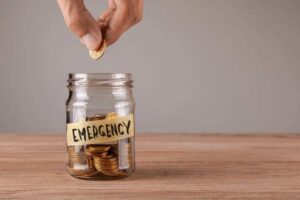Emergency fund: Why it is important & how to build it

Life is unpredictable so you should always plan for unexpected situations. Preparing ahead is essential to surviving the inevitable storms of life that we will all encounter. An emergency fund is an important and most often overlooked aspect of this preparation.
With the declining Nigerian economy, your income might not be enough to cater to your everyday needs, not to mention saving for rainy days. But it’s still not impossible; with careful planning you can still build an emergency fund.
If you’re wondering what an emergency fund is and how to build one, read on to find out.
What is an emergency fund?
An emergency fund is money saved aside for unforeseen circumstances in life. Consider it as a kind of insurance. You’re paying yourself money that you can spend later, as opposed to premiums to a corporation. If a bad thing were to happen, it would be simple and fast to get the money and prevent you from falling into debt.
Depending on who you ask, a variety of situations might be considered emergencies, but some typical examples include an unexpected medical expense, a sudden layoff, and other costly unforeseen occurrences.
The importance of an emergency fund
There are several reasons why an emergency fund is important, and I’ll highlight some of them below:
- It guarantees less money-related stress: Knowing at the back of your mind that you have money saved up for emergencies will make you feel more at ease. You know with conviction that no matter what happens you are backed up financially.
- It fosters financial discipline: Putting money aside for emergencies helps foster financial discipline, which will improve your ability to manage your money.
- It prevents you from overspending: We spend a lot of money on things we don’t need especially if we have the capacity for it. Having to set aside money for your emergency fund will help keep your spending to a minimum.
- It prevents you from accruing debt: If you find yourself in a situation that you urgently need money and you have no money kept aside just in case, you will have no choice but the take out a loan. This will put you in a financial handicap because once you’re out of your crises, you will have to start paying back the loan you took with the interest attached to it.
- It prevents you from being a burden to others: Without the safety net of an emergency fund, you will either have to turn to loans or ask for help from others. Everybody else has one financial issue or the other, and adding your burden on them is not a fair thing to do. But if you have an emergency fund, you will be able to take care of your circumstances without burdening others.
How to build an emergency fund?
Now that you know what an emergency fund is and how important it is, it is time you learn how to build one.
1. Make up your mind
The first step to starting an emergency fund is deciding you need it and want to build one. Once you’ve made up your mind, you should start saving immediately and avoid procrastinating. You shouldn’t wait till you start making more money or have a better job, start saving the little you can spare and watch it grow in the months to follow.
2. Choose the appropriate account for your emergency savings
Keep in mind that you’ll probably need to access your money fast in an emergency, so the money must be kept reasonably “liquid”—that is, in cash or readily convertible assets—so that if you need to access it quickly, you won’t lose much of its value.
Although you need to be able to access your emergency fund with ease when you need it, it shouldn’t be so easy that you can access it anytime you like lest you risk spending the money.
For example, you can make it so that the only way to withdraw is by going to the bank. Do not take out a debit card, a mobile app to access the funds, or any other means that will make it easy to access.
3. Contribute regularly
Consider your emergency savings as a regular expense. That turns it into something you have to pay for and not forego when you decide to add a new shoe to your collection. Make it into a monthly commitment and transfer money to the account whenever you receive your salary.
Consider setting several manageable monthly savings targets rather than a single, lofty one. Achieving monthly goals may boost your confidence and motivate you to continue saving. This may assist you in maintaining the routine of conserving and lessen the overall difficulty of the activity.
4. Send money automatically
The less effort required to save the easier it will be to save. Establish a direct deposit from your monthly pay or think about setting up recurring payments from your bank account to your emergency savings account. Since this requires less effort on your part, it is more likely to succeed. Even on months, you forget to save, money will still automatically be sent to your emergency savings account.
5. Save every extra money
Unexpected financial inflows, like as bonuses, tax returns, or monetary gifts, are excellent options to top up your emergency fund since you’re not accustomed to receiving them. You may get on stronger financial ground and avoid the propensity to overindulge as income increases by setting aside at least a percentage of any extra money into your emergency fund.
6. Cut down on spending
You can’t build an emergency fund if you spend every penny you earn. Think of things you spend money on that you can do without, and cut off your expenses. Avoid impulse buying, or even better stop it altogether. You should find ways to live on less if you make saving a habit.
7. Evaluate and modify your savings
After a few months, evaluate your savings and make any necessary adjustments. Remember that the more you have in your emergency fund can never be too much, so you should never stop saving if you can. If you feel like your emergency fund has accumulated significantly, you can take out some to invest, address some pressing needs or buy some assets, but you should never deplete it, and continue to save as you have been doing.
8. Honour your accomplishments
If you’re continuing with your savings habit, use this chance to celebrate your accomplishments. Choose a few self-care techniques, and after you’ve accomplished your first objective, decide on your next one.
9. Replenish your emergency fund immediately
If an emergency truly happens and you end up using up everything or a significant portion of your emergency funds, then start replenishing it immediately. Make it a habit to always save and have some money in your emergency funds at all times.
When should you use your emergency fund?
The entire purpose of having an emergency fund is to save you from having to borrow more money when you need it or from having to rush to get money at the last minute.
There can be moments when it will be tempting to spend the cash on a trip, new clothes, a change of furniture, or any other expenses that are not emergencies. For this reason, you need to compile a list of allowable outlays for your money at all times.
Make sure these are real emergencies, and only then should you spend out of your emergency fund. Some emergencies include:
- Losing your job
- Unexpected medical expenses
- Home repairs from a fire or natural disaster
- Unplanned auto repairs
- Unexpected travel costs, such as those incurred for family crises
- Unexpected court costs or tax bills
Decide for yourself what expenses are unexpected or in case of an emergency. Try to maintain consistency and only spend your emergency fund on what you view as emergencies.
Conclusion
Living below your means might be difficult, but when that rainy day comes, you’ll be glad you did, and it won’t have a significant negative effect on your financial situation overall. Concentrate on altering your perspective. You are the only one you can rely on to pull you out of difficulty.
Even if you can’t save much, start today and save what you can. You have a higher chance of surviving a disaster without accruing debt or burdening others if you have an emergency fund.
Don't miss a thing. Follow us on Telegram and Follow us on WhatsApp. If you love videos then also Subscribe to our YouTube Channel. We are on Twitter as MakeMoneyDotNG.





